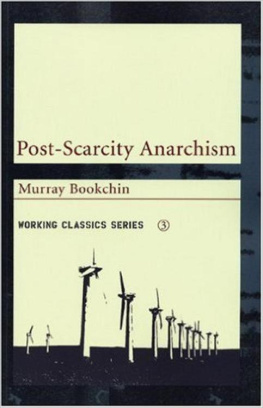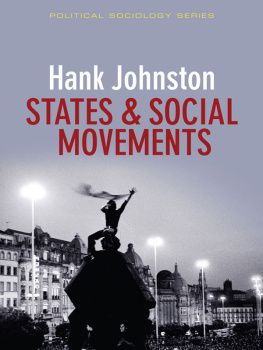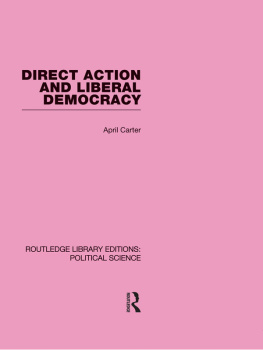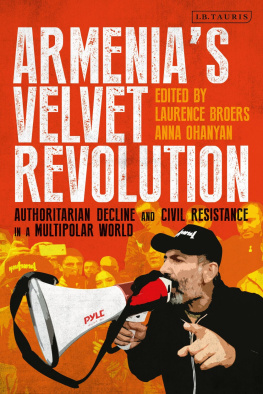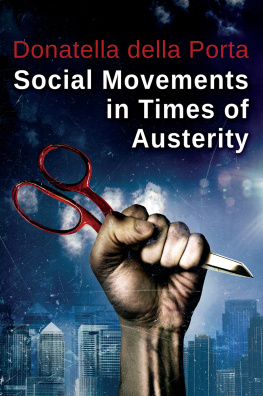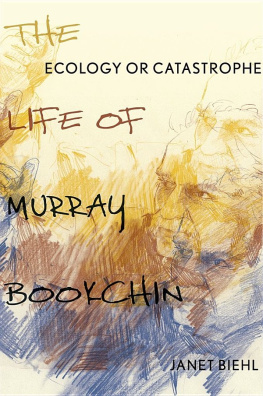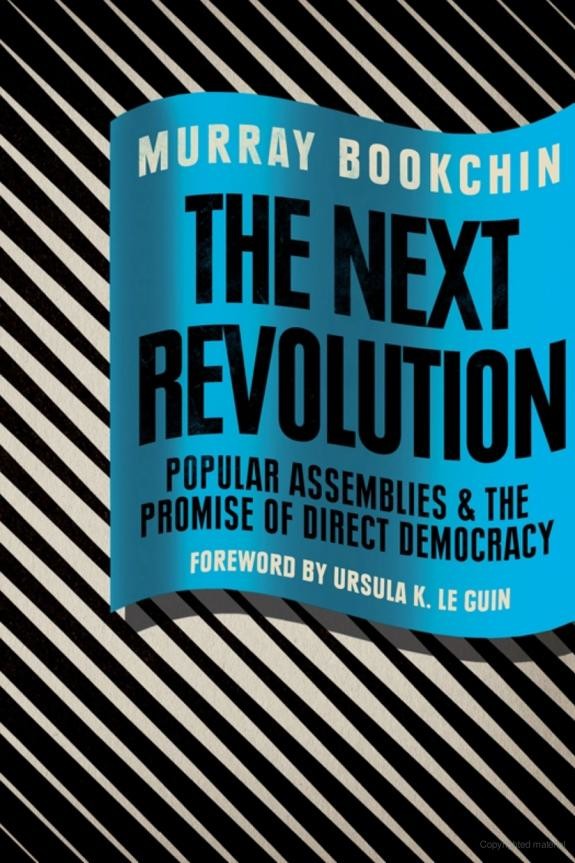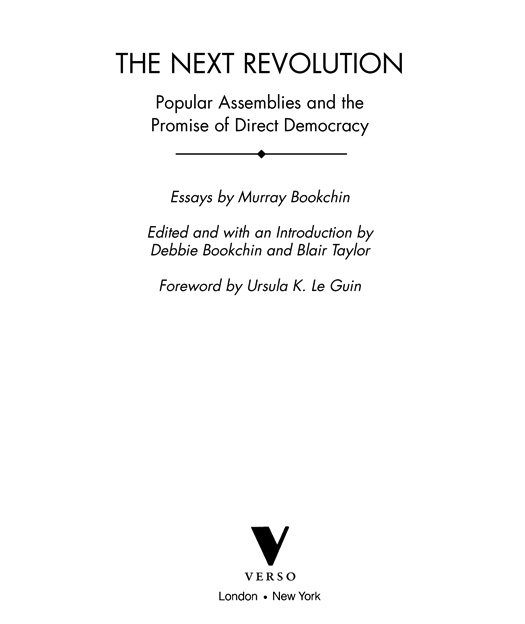First published by Verso 2015
The Murray Bookchin Trust 2015
Foreword Ursula K. Le Guin 2015
Introduction Debbie Bookchin and Blair Taylor 2015
All rights reserved
The moral rights of the authors have been asserted
Verso
UK: 6 Meard Street, London W1F 0EG
US: 20 Jay Street, Suite 1010, Brooklyn, NY 11201
www.versobooks.com
Verso is the imprint of New Left Books
ISBN-13: 978-1-78168-581-5 (PB)
ISBN-13: 978-1-78168-580-8 (HC)
e-ISBN-13: 978-1-78168-582-2 (US)
eISBN-13: 978-1-78168-733-8 (UK)
British Library Cataloguing in Publication Data
A catalogue record for this book is available from the British Library
Library of Congress Cataloging-in-Publication Data
Bookchin, Murray, 19212006.
The next revolution / Murray Bookchin, Debbie Bookchin, Blair Taylor ; preface by Ursula K. Le Guin.
pages cm
ISBN 978-1-78168-581-5 (paperback)
1. Political participation. 2. Direct democracy. I. Bookchin, Debbie.
II. Taylor, Blair. III. Title.
JF799.B67 2015
321.8dc23
2014029113
v3.1
For Bea Bookchin
confidante, intellectual partner,
and dearest friend to Murray Bookchin
for more than fifty years
Contents
Foreword
By Ursula K. Le Guin
The Left, a meaningful term ever since the French Revolution, took on wider significance with the rise of socialism, anarchism, and communism. The Russian revolution installed a government entirely leftist in conception; leftist and rightist movements tore Spain apart; democratic parties in Europe and North America arrayed themselves between the two poles; liberal cartoonists portrayed the opposition as a fat plutocrat with a cigar, while reactionaries in the United States demonized commie leftists from the 1930s through the Cold War. The left/right opposition, though often an oversimplification, for two centuries was broadly useful as a description and a reminder of dynamic balance.
In the twenty-first century we go on using the terms, but what is left of the Left? The failure of state communism, the quiet entrenchment of a degree of socialism in democratic governments, and the relentless rightward movement of politics driven by corporate capitalism have made much progressive thinking seem antiquated, or redundant, or illusory. The Left is marginalized in its thought, fragmented in its goals, unconfident of its ability to unite. In America particularly, the drift to the right has been so strong that mere liberalism is now the terrorist bogey that anarchism or socialism used to be, and reactionaries are called moderates.
So, in a country that has all but shut its left eye and is trying to use only its right hand, where does an ambidextrous, binocular Old Rad like Murray Bookchin fit?
I think hell find his readers. A lot of people are seeking consistent, constructive thinking on which to base actiona frustrating search. Theoretical approaches that seem promising turn out, like the Libertarian Party, to be Ayn Rand in drag; immediate and effective solutions to a problem turn out, like the Occupy movement, to lack structure and stamina for the long run. Young people, people this society blatantly short-changes and betrays, are looking for intelligent, realistic, long-term thinking: not another ranting ideology, but a practical working hypothesis, a methodology of how to regain control of where were going. Achieving that control will require a revolution as powerful, as deeply affecting society as a whole, as the force it wants to harness.
Murray Bookchin was an expert in nonviolent revolution. He thought about radical social changes, planned and unplanned, and how best to prepare for them, all his life. This book carries his thinking on past his own life into the threatening future we face.
Impatient, idealistic readers may find him uncomfortably tough-minded. Hes unwilling to leap over reality to dreams of happy endings, unsympathetic to mere transgression pretending to be political action: A politics of disorder or creative chaos, or a nave practice of taking over the streets (usually little more than a street festival), regresses participants to the behavior of a juvenile herd. That applies more to the Summer of Love, certainly, than to the Occupy movement, yet it is a permanently cogent warning. But Bookchin is no grim puritan. I first read him as an anarchist, probably the most eloquent and thoughtful one of his generation, and in moving away from anarchism he hasnt lost his sense of the joy of freedom. He doesnt want to see that joy, that freedom, come crashing down, yet again, among the ruins of its own euphoric irresponsibility.
What all political and social thinking has finally been forced to face is, of course, the irreversible degradation of the environment by unrestrained industrial capitalism: the enormous fact of which science has been trying for fifty years to convince us, while technology provided us ever greater distractions from it. Every benefit industrialism and capitalism have brought us, every wonderful advance in knowledge and health and communication and comfort, casts the same fatal shadow. All we have, we have taken from the earth; and, taking with ever-increasing speed and greed, we now return little but what is sterile or poisoned. Yet we cant stop the process. A capitalist economy, by definition, lives by growth; as he observes: For capitalism to desist from its mindless expansion would be for it to commit social suicide. We have, essentially, chosen cancer as the model of our social system.
Capitalisms grow-or-die imperative stands radically at odds with ecologys imperative of interdependence and limit. The two imperatives can no longer coexist with each other; nor can any society founded on the myth that they can be reconciled hope to survive. Either we will establish an ecological society or society will go under for everyone, irrespective of his or her status.
Murray Bookchin spent a lifetime opposing the rapacious ethos of grow-or-die capitalism. The nine essays in this book represent the culmination of that labor: the theoretical underpinning for an egalitarian and directly democratic ecological society, with a practical approach for how to build it. He critiques the failures of past movements for social change, resurrects the promise of direct democracy and, in the last essay in this book, sketches his hope of how we might turn the environmental crisis into a moment of true choicea chance to transcend the paralyzing hierarchies of gender, race, class, nation, a chance to find a radical cure for the radical evil of our social system. Reading it, I was moved and grateful, as I have so often been in reading Murray Bookchin. He was a true son of the Enlightenment in his respect for clear thought and moral responsibility and in his honest, uncompromising search for a realistic hope.
Introduction
The world today confronts not one, but a series of interlocking criseseconomic, political, social, and ecological. The new millennium has been marked by a growing gap between rich and poor that has reached unprecedented levels of disparity, consigning an entire generation to diminished expectations and dismal prospects. Socially, the trajectory of the new century has been equally bleak, particularly in the developing world, where sectarian violence in the name of religion, tribalism, and nationalism has turned entire regions into insufferable battle zones. Meanwhile, the environmental crisis has worsened at a pace that has exceeded even the most pessimistic forecasts. Global warming, rising sea levels, pollution of the air, soil, and oceans, and the destruction of massive tracts of rain forest have accelerated at such alarming rates that the environmental catastrophe that was expected to reach grave proportions sometime in the next century has instead become the pressing, urgent concern of this generation.


